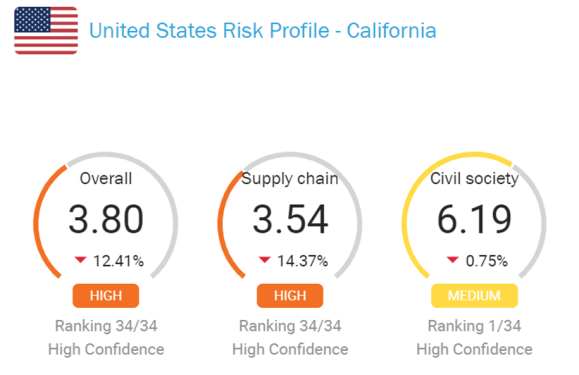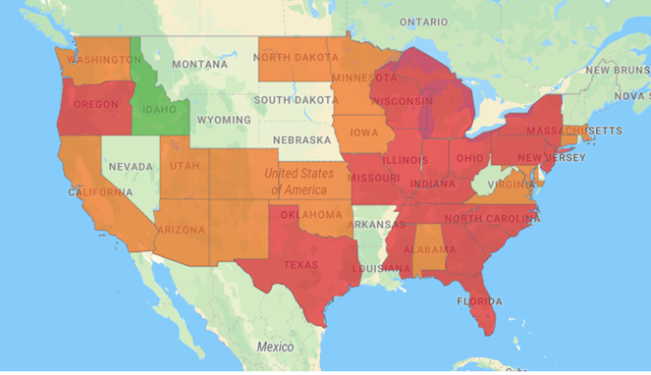Why Wouldn’t The United States Be High Risk for ESG?
The New York Times, Department of Labor Exposes Shouldn’t Surprise Anyone
A US Department of Labor report published last month uncovered labor violations in at least 80% of the contractors and manufacturers surveyed in Southern California. The investigation comes on the heels of a recent New York Times report exposing many household brands for their connection to child labor in the US, another instance highlighting the importance of supply chain visibility.
The Department of Labor survey showed more than 50% of employers were illegally paying workers. One case found a contractor paying employees as little as $1.58 per hour. The Department of Labor also found that in 2022, 32% of the contractors investigated were paying garment workers piece-rate wages, a practice prohibited by the State of California. Data from our supply chain due diligence platform EiQ corroborates these findings. One metric of risk used to evaluate the likelihood of wage related issues in audits in California dropped by nearly 65% over the past year.

In our 2023 update, the state of California is ranked as a high-risk jurisdiction for overall risk of ESG violations. ELEVATE weighs over 100 indexes, compiled through its audit footprint and civil society organizations, in making overall risk determinations. Other US States to receive a high overall risk rating include Georgia, Illinois, Minnesota, New York, North Carolina, Ohio, Pennsylvania, and Texas.
Wages violations refer to non-conformities with supply chain standards, which can include workers being paid less than the legal minimum wage, not being paid for overtime hours, illegal wage deductions or late wage payments. A report published by the Economic Policy Institute (EPI) estimated that workers in California lose an estimated $2 billion in minimum wage violations alone every year.
Wage Violations in California – and the US – Are Not New
Wage gaps persist in California in spite of stringent legislation. EPI reported that California governing agencies recovered more than $221 million in stolen wages from 2017-2020. While California is known to have some of the strongest regulations for wages issues in the US, such as the 2011 Wage Theft Prevention Act and its decision to raise the minimum wage amount for most workers in 2023, enforcement of the laws has not yet been effective enough to mitigate the issue.
The issue of low or unpaid wages extends much further than California. For the US nationwide, specifically for risk of wages issues, the country’s score also dropped last year, exhibiting a decline of more than 40%. Our adverse media scanning tool, Sentinel, detected at least 330 incidents related to wage issues in the US alone over the past five years. These include instances of workers being denied meal breaks and having overtime pay withheld.
Child Labor and Forced Labor Show Increasing Risk Throughout the US
The US is presumed to be a lower risk country for manufacturing, but we see that the country has shown significant drops in scores in several supply chain indices, signaling ESG risk. Child labor risk, forced labor risk, risk for both domestic and foreign migrant workers, humane treatment, wages and working hours risks all have all increased in the past year. For each, the US is now a high-risk production region.
Manufacturing jurisdictions like Ohio, New York, and Florida not only show extreme risk for forced labor but are now seeing higher forced labor risk than other historically high-risk countries. China and India, known for their exposure to forced labor risk, are currently rated as lower risk than the states of Ohio, New York and Florida.
The US: Forced Labor Risks Visualized

In our 2023 rankings, 18 US States were ranked as at extreme risk of forced labor, and 16 as high risk. ELEVATE’s forced labor index is based on instances of non-compliances associated with instances of forced labor, and passport retentions identified in a site.
Visibility has been a word tossed around the ESG space without critical evaluation of its implications for Western markets. It is our hope that these recent exposes challenge this notion, showing what has long been visible through our audit data: the US is high risk too.
These blogs are written by ELEVATE staff members or associates and the views and opinions expressed are not necessarily those of ELEVATE.
About the author
